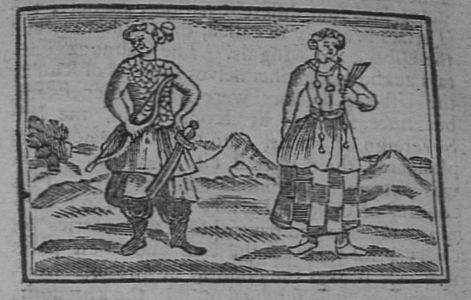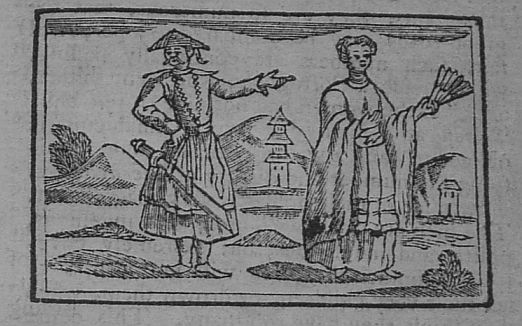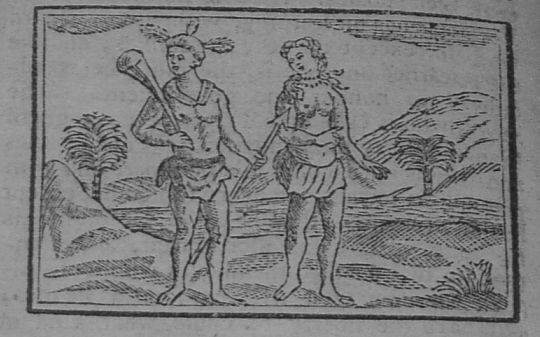(115)
ASIA.
A Man and Woman of Tartary in their
proper
Habits.

An Account of TARTARY
.
TARTARY, which is the same country as
the ancient Scythia, comprehends
all the North of Europe, and almost a third part of Asia. At
present the Russians possess the North part and have given it the name
of Siberia. It is a cold barren country, generally covered with
snow, and very thinly inhabited.
Their wealth consists in cattle, and their employment in grazing.
They carry on neither manufacture nor trade, except in slaves and
horses, and rove about in herds or clans. The Emperor of Russia
is supreme Lord of the Western as well as North part of Tartary,
(116)
especially since the time of the late Czar Peter the Great, who
extended his conquests even to the Northern coast of the Caspian Sea.
The Chinese are masters of the South and East parts of Tartary. The
Tartars are divided into four different nations, namely, the Tartars
properly so called, the Calmucks, and the Usbeck and Moguls. The
Calmuck Tartars acknowledge themselves subjects of Russia; the Usbeck
Tartars were once independent, but since subdued by Kouli Khan, the
late Sovereign of Persia [also
known as Nadir Shah, sometimes described as the "Persian Napoleon",
assassinated 1747; one of the unlucky owners of the fabulous Koh-i-Noor
diamond], who took possession and plundered their
capital city Bochara, which was extremely populous and wealthy. This
country of Usbeck Tartary is situate in a very happy climate and
fruitful soil, and carries on a very brisk trade to the East and West
parts of Asia: it was the country of the victorious Tamerlane, who
subdued most of the kingdoms of Asia.
The Tartars, as to stature, are generally thick and short, having
flat square faces, little eyes, little round short noses, and an olive
complexion. They are reckoned the best archers in the world, and eat
all manner of flesh but hog's-flesh. They are very hospitable, and take
a pleasure in entertaining strangers. Their religion is mostly
Paganism, they worship the Sun, Moon, and Stars, and a variety of
images, but not in temples or churches, for they worship in groves and
on the tops of monntains [sic];
but those that live near the Mahometan
countries are mostly Maho-
(117)
metans. The Southern provinces lie in a
temperate climate, and would produce all manner of corn and vegetables;
but the inhabitants pay no regard to it, and lead a rambling life,
driving great herds of cattle before them to such parts of the country
where they can meet with the best pasture, and here they pitch their
tents, but seldom remain long enough in a place to reap a crop of corn,
even if they were to plough the land and sow it.
A Chinese Man and Woman in their
proper Habits.

An Account of CHINA.
THE Empire of China is a great and spacious country, on the East of
Asia, famed for its fruitfulness, wealth, beautifulness of towns, and
incredible number of inhabitants.
(118)
It is divided into seventeen kingdoms, which contain 160 large
cities, 240 lesser, and 1200 towns; the chief of all is Pekin.
The air is pure and serene, and the inhabitants live to a great
age. Their riches consist in gold and silver mines, pearls,
porcelain or China ware; japanned or varnished works; spices, musk,
true ambergris, camphire [sic],
sugar, ginger, tea, linen, and silk; of the latter there is such
abundance, that they are able to furnish all the world with it.
Here are also mines of quicksilver, vermillion, azure-stone [lapis lazuli], vitriol [sulfuric acid, or various sulfates],
&c. So much for the wealth: Now as to the inhabitants, they
are so numerous, that the great roads may be compared to a perpetual
fair, such numbers are continually passing, which made a Portuguese,
who went thither, ask, "If the women had not nine or ten children at a
birth?" Every inhabitant is obliged to hang a writing over
his door, signifying the number and quality of the dwellers. The
inside of their houses is very magnificent. The men are civil,
well-bred, very ingenious, polite, and industrious, but extremely
covetous, insomuch that they will not scruple to sell their very
children, or drown them, when they think they have too many. This
desire of wealth lets them never be idle, and makes them have a great
aversion to strangers that come to settle among them. The men go
neatly dressed, and carry a fan in their hand, and when they salute
each other (for they are very courteous) they never put off their hat,
(119)
but with their hands joined before their breast bow their
bodies. Here is no Nobility but what depends on learning, without
any regard to birth, except the Royal Families; and the more learned
any one is, the more he is advanced in honour and government. The
King, who is called the Tartar [the
current (Qing) dynasty was Manchurian], keeps a guard of forty
thousand
men. When he dies his body is buried on a pile of paper, and with
him all his jewels, and every thing else, except living creatures, that
he made use of in his life-time. His Counsellor, Priest, and
Concubines, that devoted themselves wholly to his soul, sacrifice their
lives as soon as he dies; but have the liberty to chuse what kind
of death they please, which is generally beheading. In this
country there is a stupendous wall, built to prevent the incursions of
the Tartars, which is at least 1700 miles long, near 30 feet high, and
broad enough for several horsemen to travel on it abreast. Their
established religion is what they call the Religion of Nature, as
explained by their celebrated Philosopher Confucius; but the greatest
part of them are Idolaters, and worship the Idol Fo [Buddha; Buddhism arrived in China in
the 2nd cent. BCE]. The Mahometans have been
long since tolerated, and the Jews longer. Christianity had
gained a considerable footing here by the labour of the Jesuits, till
the year 1726, when the missionaries being suspected of a design
against the Government, were quite expelled.
(120)
An Indian Man and Woman in their
proper Habits.

An Account of INDIA
.
INDIA, one of the greatest regions of
Asia, is bounded on the East by China, on the West by Persia, North by
Great Tartary, and on the South by the Indian Sea. It is divided
into three parts, viz. Indostan, or the Empire of the Great Mogul;
India on this side the Ganges, and India beyond; the cities of Deli
[sic] and Agra are the two
chief, and, by turns, the residence of the Great Mogul, at each of
which he has a very splendid palace. The most noted city on the
coast is Surat, a place of great trade, where the English have a
factory. India on this side the Ganges contains many petty
kingdoms. On the coast are Goa, belonging to the Portuguese,
which is their staple for East-India goods; and Bombay, a little island
(121)
and town belonging to the English. On this coast are Pondicherry,
Fort St. David
[in Cuddalore near
Devanampattinam], and Fort St. George
[in Chennai], which belong to
the English, who
in fact possess the supreme dominion of the country, most of the native
princes being either dependent on them, or happy to enter into alliance
with them. India beyond the Ganges, is also divided into various
kingdoms, and contains a great number of large and populous cities, of
which we have no knowledge besides their names. The people are
for the most part tawny, strong, and big, but very lazy. They eat
on beds, or tapestry spread on the ground. They burn most of
their dead, and their wives glory in being thrown into the funeral
piles, and there consumed to ashes
[sati, or suttee, remained
legal in some princely states for a time after it had been abolished
in lands under British control. The last such state to permit it,
Jaipur, banned the practice in 1846]. The Great Mogul is a
Mahometan, and esteemed the richest King in the world in jewels; one of
his thrones is said to have cost five millions sterling
[over 350M sterling in today's terms,
according to eh.net].
Their commodities are silks, cottons, callicoes
[www.straw.com/sig/dyehist.html
states The East India Co. began importation of calico from Calicut in
India in 1631-1633], muslins, sattins
[sic], carpets, gold, silver,
diamonds, pearls, porcelain, rice, ginger, rhubarb
[this would have been the medicinal
variety - www.rhubarbinfo.com says it became a major state monopoly for
Russia and an
important commodity for the East India companies], aloes, amber,
indigo, cinnamon, cocoa, &c. They are mostly Pagans, and
worship idols of various shapes, and the rest are Mahometans, except a
few Christians. Their monarch is absolute, and so are all the
petty Kings; who are so fond of titles that they often take them from
their jewels, furnitures, equipage, and elephants, to make up a
number. This country is so exceeding rich, that it is thought by
many to be the Land of Ophir, where Solomon sent for gold.
(122)
Of
TURKEY in ASIA.
THIS vast continent takes in Natolia [also called Asia Minor],
Arabia, Phœnicia, Judea, or Palestine, and the Euphratian
Provinces. The people are chiefly Mahometans, though there are
many Jews and Christians in some places among them. There are
various governments, but they are all subject to the Grand Signior, who
depopulates these fine countries, and discourages industry; so that the
Phœnicians, formerly famous for commerce, are at present a poor
despicable people; and Judea, the land which heretofore flowed with
milk and honey, is in general still fruitful, abounding in corn, wine,
and oil, where cultivated, and might supply the neighbouring countries
with all these, as they anciently did, were the inhabitants equally
industrious. The parts above Jerusalem, its once famous capital,
are mostly mountainous and rocky; but they feed numerous herds and
flocks, and yield plenty of honey, wine, and oil, and the vallies [sic] abound with large crops of
corn.
Shaw's
Travels.




